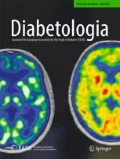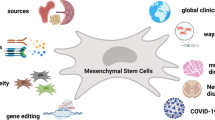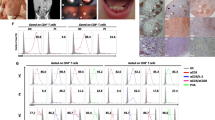Abstract
Aims/hypothesis
Mesenchymal stem cells (MSCs) have been shown to abrogate in vitro the proinflammatory response in type 1 diabetes. The mechanism involves paracrine factors, which may include microvesicles (MVs). We evaluated whether MVs derived from heterologous bone-marrow MSCs exert an immunomodulatory effect on T cell responses against GAD (glutamic acid decarboxylase) antigen in type 1 diabetes.
Methods
MVs were purified from heterologous human MSCs by differential centrifugation. Peripheral blood mononuclear cells (PBMCs) were obtained from patients with type 1 diabetes at disease onset, and responses to GAD65 stimulation were assessed by IFN-γ enzyme-linked immunosorbent spot analysis. Levels of cytokines and prostaglandin E2 (PGE2) were measured in the supernatant fraction, and T helper 17 (Th17) and regulatory T cell analysis was performed.
Results
MVs were internalised by PBMCs, as assessed by confocal microscopy and flow cytometry analyses. MVs significantly decreased IFN-γ spots and levels in GAD65-stimulated PBMCs, and significantly increased transforming growth factor-β (TGF-β), IL-10, IL-6 and PGE2 levels. Furthermore, MVs decreased the number of Th17 cells and the levels of IL-17, and increased FoxP3+ regulatory T cells in GAD65-stimulated PBMCs.
Conclusions/interpretation
These results provide evidence that MSC-derived MVs can inhibit in vitro a proinflammatory response to an islet antigenic stimulus in type 1 diabetes. The action of MVs involves PGE2 and TGF-β signalling pathways and IL-10 secretion, suggesting a switch to an anti-inflammatory response of T cells.





Similar content being viewed by others
Abbreviations
- BrdU:
-
5-Bromo-2′-deoxyuridine
- ELISPOT:
-
Enzyme-linked immunosorbent spot
- GAD:
-
Glutamic acid decarboxylase
- HLA-G5:
-
Human leucocyte antigen G5
- IA2:
-
Insulinoma-associated protein 2
- ICA:
-
Islet-cell antibody
- IDO:
-
Indoleamine 2,3-dioxygenase
- miRNA:
-
MicroRNA
- MSC:
-
Mesenchymal stem cell
- MV:
-
Microvesicle
- PBMC:
-
Peripheral blood mononuclear cell
- PD1:
-
Programmed cell death protein 1
- PD-L1:
-
Programmed cell death 1 ligand 1
- PGE2 :
-
Prostaglandin E2
- PMA:
-
Phorbol myristate acetate
- PV:
-
Pentavac
- SI:
-
Stimulation index
- TGF-β1:
-
Transforming growth factor-β1
- Th2:
-
T helper 2
- Th17:
-
T helper 17
- Treg:
-
Regulatory T cell
References
Atkinson MA, Eisenbarth GS (2001) Type 1 diabetes: new perspectives on disease pathogenesis and treatment. Lancet 358:221–229
Matthews JB, Staeva TP, Bernstein PL, Peakman M, von Herrath M (2010) Developing combination immunotherapies for type 1 diabetes: recommendations from the ITN-JDRF Type 1 Diabetes Combination Therapy Assessment Group. Clin Expert Immunol 160:176–184
Deng W, Han Q, Liao L, You S, Deng H, Zhao RC (2005) Effects of allogenic bone marrow-derived mesenchymal stem cells on T and B lymphocytes from BXSB mice. DNA Cell Biol 24:458–463
Zappia E, Casazza S, Pedemonte E, Benvenuto F, Bonanni I, Gerdoni E (2005) Mesenchymal stem cells ameliorate experimental autoimmune encephalomyelitis inducing T cell anergy. Blood 106:1755–1761
Aggarwal S, Pittenger MF (2005) Human mesenchymal stem cells modulate allogeneic immune cell responses. Blood 105:1815–1822
Abdi R, Fiorina P, Adra CN, Atkinson M, Sayegh MH (2008) Immunomodulation by mesenchymal stem cells: a potential therapeutic strategy for type 1 diabetes. Diabetes 57:1759–1767
Zanone MM, Favaro E, Miceli I et al (2010) Human mesenchymal stem cells modulate cellular immune response to islet antigen glutamic acid decarboxylase in type 1 diabetes. J Clin Endocrinol Metab 95:3788–3797
Ezquer F, Ezquer M, Contador D, Ricca M, Simon V, Conget P (2012) The antidiabetic effect of mesenchymal stem cells is unrelated to their transdifferentiation potential but to their capability to restore Th1/Th2 balance and to modify the pancreatic microenvironment. Stem Cells 30:1664–1674
Fiorina P, Voltarelli J, Zavazava N (2011) Immunological application of stem cells in type 1 diabetes. Endocr Rev 32:725–754
Li YP, Paczesny S, Lauret E, Poirault S et al (2008) Human mesenchymal stem cells license adult CD34+ hemopoietic progenitor cells to differentiate into regulatory dendritic cells through activation of the Notch pathway. J Immunol 180:1598–1608
Selmani Z, Naji A, Zidi I et al (2008) Human leukocyte antigen-G5 secretion by human mesenchymal stem cells is required to suppress T lymphocyte and natural killer function and to induce CD4+ CD25highFOXP3+ regulatory T cells. Stem Cells 26:212–222
Collino F, Deregibus MC, Bruno S et al (2010) Microvesicles derived from adult human bone marrow and tissue specific mesenchymal stem cells shuttle selected pattern of miRNAs. PLoS One 27:1–15
Lai RC, Chen TS, Lim SK (2011) Mesenchymal stem cell exosome: a novel stem cell-based therapy for cardiovascular disease. Regen Med 6:481–492
Gatti S, Bruno S, Deregibus MC et al (2011) Microvesicles derived from human adult mesenchymal stem cells protect against ischaemia-reperfusion-induced acute and chronic kidney injury. Nephrol Dial Transplant 26:1474–1483
Bruno S, Grange C, Deregibus MC et al (2009) Mesenchymal stem cell-derived microvesicles protect against acute tubular injury. J Am Soc Nephrol 20:1053–1067
Timmers L, Lim SK, Arslan F et al (2007) Reduction of myocardial infarct size by human mesenchymal stem cell conditioned medium. Stem Cells Res 1:129–137
Ratajczak MZ, Kucia M, Jadczyk T et al (2012) Pivotal role of paracrine effects in stem cell therapies in regenerative medicine: can we translate stem cell-secreted paracrine factors and microvesicles into better therapeutic strategies? Leukemia 26:1166–1173
Théry C, Ostrowski M, Segura E (2009) Membrane vesicles as conveyors of immune responses. Nat Rev Immunol 9:581–593
American Diabetes Association (2009) Diagnosis and classification of diabetes mellitus. Diabetes Care 32(Suppl 1):S62–S67
Bruno S, Grange C, Collino F et al (2012) Microvesicles derived from mesenchymal stem cells enhance survival in a lethal model of acute kidney injury. PLoS One 7:1–11
Herrera MB, Bussolati B, Bruno S, Fonsato V, Romanazzi GM, Camussi G (2004) Mesenchymal stem cells contribute to the renal repair of acute tubular epithelial injury. Int J Mol Med 14:1035–1041
Christopeit M, Schendel M, Föll J, Müller LP, Keysser G, Behre G (2008) Marked improvement of severe progressive systemic sclerosis after transplantation of mesenchymal stem cells from an allogeneic haploidentical-related donor mediated by ligation of CD137L. Leukemia 22:1062–1064
Lee RH, Seo MJ, Reger RL et al (2006) Multipotent stromal cells from human marrow home to and promote repair of pancreatic islets and renal glomeruli in diabetic NOD/scid mice. Proc Natl Acad Sci USA 103:17438–17443
Karnieli O, Izhar-Prato Y, Bulvik S, Efrat S (2007) Generation of insulin-producing cells from human bone marrow mesenchymal stem cells by genetic manipulation. Stem Cells 25:2837–2844
Zhao M, Amiel SA, Ajami S et al (2008) Amelioration of streptozotocin-induced diabetes in mice with cells derived from human marrow stromal cells. PLoS ONE 3:1–9
Reading JL, Yang JHM, Sabbah S et al (2013) Clinical-grade multipotent adult progenitor cells durably control pathogenic T cell responses in human models of transplantation and autoimmunity. J Immunol 190:4542–4552
Tan J, Wu W, Xu X et al (2012) Induction therapy with autologous mesenchymal stem cells in living-related kidney transplants: a randomized controlled trial. JAMA 307:1169–1177
Uccelli A, Moretta L, Pistoia V (2008) Mesenchymal stem cells in health and disease. Nat Rev Immunol 8:726–736
Arif S, Moore F, Marks K et al (2011) Peripheral and islet interleukin-17 pathway activation characterizes human autoimmune diabetes and promotes cytokine-mediated β-cell death. Diabetes 60:2112–2119
Spaggiari GM, Capobianco A, Abdelrazik H, Becchetti F, Mingari MC, Moretta L (2008) Mesenchymal stem cells inhibit natural killer-cell proliferation, cytotoxicity, and cytokine production: role of indoleamine 2,3-dioxygenase and prostaglandin E2. Blood 111:1327–1333
Pap E, Pállinger E, Falus A (2011) The role of membrane vesicles in tumorigenesis. Crit Rev Oncol Hematol 79:213–223
Di Nicola M, Carlo-Stella C, Magni M et al (2002) Human bone marrow stromal cells suppress T-lymphocyte proliferation induced by cellular or nonspecific mitogenic stimuli. Blood 99:3838–3843
Chen W, Frank ME, Jin W, Wahl SM (2001) TGF-beta released by apoptotic T cells contributes to an immunosuppressive milieu. Immunity 14:715–725
Patel SA, Meyer JR, Greco SJ, Corcoran KE, Bryan M, Rameshwar P (2010) Mesenchymal stem cells protect breast cancer cells through regulatory T cells: role of mesenchymal stem cell-derived TGF-beta. J Immunol 184:5885–5894
Horwitz DA, Zheng SG, Gray JD (2008) Natural and TGF-beta-induced Foxp3(+)CD4(+)CD25(+) regulatory T cells are not mirror images of each other. Trends Immunol 29:429–435
Luo X, Yang H, Kim IS et al (2005) Systemic transforming growth factor-beta1 gene therapy induces Foxp3+ regulatory cells, restores self-tolerance, and facilitates regeneration of beta cell function in overtly diabetic nonobese diabetic mice. Transplantation 79:1091–1096
Peng Y, Laouar Y, Li MO, Green EA, Flavell RA (2004) TGF-beta regulates in vivo expansion of Foxp3-expressing CD4+ CD25+ regulatory T cells responsible for protection against diabetes. Proc Natl Acad Sci U S A 101:4572–4577
Butz H, Rácz K, Hunyady L, Patocs A (2012) Crosstalk between TGF-β signaling and the microRNA machinery. Trends Pharmacol Sci 33:382–393
Fiorina P, Jurewicz M, Augello A et al (2009) Immunomodulatory function of bone marrow-derived mesenchymal stem cells in experimental autoimmune type 1 diabetes. J Immunol 183:993–1000
Madec AM, Mallone R, Afonso G et al (2009) Mesenchymal stem cells protect NOD mice from diabetes by inducing regulatory T cells. Diabetologia 52:1391–1399
Boumaza I, Srinivasan S, Witt WT et al (2009) Autologous bone marrow-derived rat mesenchymal stem cells promote PDX-1 and insulin expression in the islets, alter T cell cytokine pattern and preserve regulatory T cells in the periphery and induce sustained normoglycemia. J Autoimmun 32:33–42
Augello A, Tasso R, Negrini SM et al (2005) Bone marrow mesenchymal progenitor cells inhibit lymphocyte proliferation by activation of the programmed death 1 pathway. Eur J Immunol 35:1482–1490
Jurewicz M, Yang S, Augello A et al (2010) Congenic mesenchymal stem cell therapy reverse hyperglycemia in experimental type 1 diabetes. Diabetes 59:3139–3147
Mokarizadeh A, Delirezh N, Morshedi A, Mosayebi G, Farshid AA, Mardani K (2012) Microvesicles derived from mesenchymal stem cells: potent organelles for induction of tolerogenic signaling. Immunol Lett 147:47–54
Koenen HJ, Smeets RL, Vink PM, van Rijssen E, Boots AM, Joosten I (2008) Human CD25 high Foxp3 pos regulatory T cells differentiate into IL-17-producing cells. Blood 112:2340–2352
Ghannam S, Pène J, Torcy-Moquet G, Jorgensen C, Yssel H (2010) Mesenchymal stem cells inhibit human Th17 cell differentiation and function and induce a T regulatory cell phenotype. J Immunol 185:302–312
Kristiansen OP, Mandrup-Poulsen T (2005) Interleukin-6 and diabetes: the good, the bad, or the indifferent? Diabetes 54(Suppl 2):S114–S124
Staeva TP, Chatenoud L, Insel R, Atkinson MA (2013) Recent lessons learned from prevention and recent-onset type 1 diabetes immunotherapy trials. Diabetes 62:9–17
Sundin M, Barrett AJ, Ringdén O et al (2009) HSCT recipients have specific tolerance to MSC but not to the MSC donor. J Immunother 32:755–764
Acknowledgements
We are grateful to sample donors for contributing to this research.
Funding
This work was supported by Regione Piemonte, Piattaforme Biotecnologiche, Pi-Stem project and by a grant from Fresenius Medical Care.
Duality of interest
GC and MCD. are named inventors in related patents. CT is a full-time employee of Fresenius Medical Care Germany. The other authors declare that there is no duality of interest associated with this manuscript.
Contribution statement
MMZ and EF conceived and designed the study, performed experiments and analysed data. MMZ and GC wrote the manuscript. AC, SL, AF, CC, MCD and SB designed and performed experiments and analysed data. MG and GC contributed to the study design and data analysis and oversaw research. AA, MP, PCP and CT. interpreted data and contributed to the discussion. All the authors critically revised the manuscript and approved the final version of the article to be published. GC and MMZ are the guarantors of this work and, as such, had full access to all the data and take responsibility for the integrity of the data and the accuracy of the data analysis.
Author information
Authors and Affiliations
Corresponding authors
Electronic supplementary material
Below is the link to the electronic supplementary material.
ESM Figure 1
(PDF 138 kb)
ESM Table 1
(PDF 59 kb)
Rights and permissions
About this article
Cite this article
Favaro, E., Carpanetto, A., Lamorte, S. et al. Human mesenchymal stem cell-derived microvesicles modulate T cell response to islet antigen glutamic acid decarboxylase in patients with type 1 diabetes. Diabetologia 57, 1664–1673 (2014). https://doi.org/10.1007/s00125-014-3262-4
Received:
Accepted:
Published:
Issue Date:
DOI: https://doi.org/10.1007/s00125-014-3262-4




